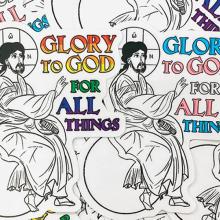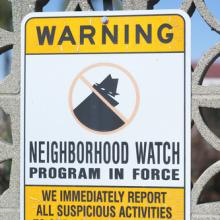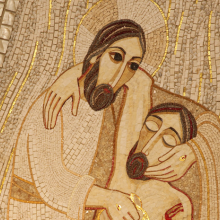Good Samaritan
ACCORDING TO AN Orthodox miracle story, St. Nicholas — the fourth century archbishop who inspired the figure of Santa Claus — quieted a raging sea. When sailors were caught in a storm on the Mediterranean, they called out for help. Nicholas appeared, walking on the waves before them. He blessed the ship, and the storm calmed. This is why he became the patron saint of sailors. It’s also why Mary Marza, a queer Orthodox artist in her mid-20s who is based in Los Angeles, illustrated St. Nicholas as a “waterbender.” Waterbenders, from the animated series Avatar: The Last Airbender, can control water and its movements. This is one of many works featured on her Instagram art account, Art of Marza.
“I liked the concept of blending saints with the elements or just blending the saints with things from my favorite stories and pop culture,” Marza wrote in an Instagram caption about this portrayal of St. Nicholas.
Marza (who asked to use her art account name instead of her real last name for this article) creates digital art and stickers that blend Orthodox iconography and prayer with street art and anime. The grungy, graffiti-and-animation-inspired aesthetic of her art and its confluence with iconography is part of her longing to “[see] God in places where people assume we can’t find Him,” she wrote on Instagram.
WHAT MAKES THE parable of the good Samaritan so iconic and powerful? There’s a lesson about helping others in need, sure. But as Jesus taught a few chapters earlier, everybody helps those in their inner circle or who can pay them back (Luke 6:32-34). No, the point of the good Samaritan parable (Luke 10:25-37) is that really “loving our neighbor” looks like tangible service, at some cost to ourselves, even when it’s someone outside our ethno-religious group. “Good Samaritans” are the sorts of people Jesus wants to present to the world to say, “These are my representatives.”
These days, there’s tremendous concern about the rise of “white Christian nationalism,” and with good reason. I’ve spent nearly a decade documenting the impact of this ideology—the belief that America has been and should always be for “Christians like us”—on Americans’ political views and behaviors. The results are alarming. But one potential risk of our being genuinely concerned about the real threat of Christian nationalism is that young Christians can feel like any political participation is tainted or suspect—we wouldn’t want to be Christian nationalists, after all. On the contrary, Christian political involvement can be a tremendous witness when we think about what it means to be good Samaritans today.
Americans who subscribe to white Christian nationalism think in terms of in-groups and hierarchies. They believe their group made the nation prosperous and that their cultural and political power is being threatened by ethnic and religious outsiders, such as immigrants, Muslims, secular persons, LGBTQ persons, and those who challenge the racial status quo like Black Lives Matter. Because of this, the political goals of white Christian nationalism are fundamentally anti-pluralist and anti-democratic. The goal isn’t to include more voices; the goal is power for “us.”

Bishop Michael Curry, the presiding bishop of the Episcopal Church, speaks to the media on Sept., 22, 2021, following a meeting between a coalition of Christian denominations and the White House to discuss investments in anti-poverty initiatives and programs that support children and families. REUTERS/Evelyn Hockstein
We've long argued that budgets — including our federal budgets — are moral documents. As Christians, we see this as a principle deeply rooted in scripture, including Luke's gospel, which explains that the two greatest commandments are to love God and love our neighbors (Luke 10:27). In that same passage, Jesus tells the parable of the Good Samaritan, a story about how our love for God and neighbor will be tested when our neighbors need us the most.
Fratelli Tutti, Pope Francis’ encyclical on “social friendship” released in October, sounds like a new gelato flavor—something between fior di latte and tutti frutti. Like the Italian frozen dessert, Francis’ pastoral sections melt in your mouth—but a nutty, bitter crunch hides in every bite.
Encyclical letters are used by popes to address important issues. Recently, these letters have been addressed not only to Catholics, but to “all people of good will.”
Where Laudato Si’, released five years ago, developed new doctrine and broke ground in Catholic social teaching to address the fierce urgency of climate collapse, “On Universal Fraternity and Social Friendship” (as it’s called in English) counsels us not to backslide as a human family. Cardinal Michael Czerny said, “If Laudato Si’ taught us that every thing is connected, then Fratelli Tutti teaches us that everyone is connected.”
You shall love the Lord your God with
all your heart, and with all your soul,
and with all your strength, and with
all your mind; and your neighbor
as yourself. —Luke 10:27
such is the lawyer.
we need to know.
road less traveled.
not robert frost.
in that space.
like a typewriter
on table, sewing
machine sitting still
this is why i do this
work. not the walking
dead. not some george
romero extra. like the
young troubled girl in
my neighborhood just
last week. no one reached
out. they called the police.
locked their doors, windows.
they became priest, levite
on the other side of the
road. it was like when
i was 13 standing on the
high dive. gravity take
over. send me to water
below. don’t be everyone.
ask of myself each second:
will i cross the road? “it is
written in the law.” heart
& soul. love. neighbor.
even if they aren’t nice. another
chance to hear that answer.
"The parable of the good Samaritan is one that has been used over and over again to welcome strangers," Pelosi said. "Samaritans were not friends to the person that the Samaritan saved. But he was a man of justice."
Pope Francis told a group of recently appointed bishops that the world “is tired of charming liars” and that they should embody mercy in their dioceses and not be whiners who promote their own “vain crusades.”
The pontiff also told them to be wary of seminarians “who take refuge in rigidity” of practices. “There’s always something ugly behind it,” he said.
Francis made his remarks Sept. 16 in a speech to newly appointed bishops who have been taking part in an annual Vatican orientation course on their new job.

Donald Trump speaks during a press conference on July 16 in New York. JStone / Shutterstock.com
So why did I mention Donald Trump in the title? Because I want to suggest that he has set up his story very differently than Jesus. Across this country Donald Trump has cast Samaritans as “criminals” and “rapists.” He wants to build a wall and separate us. Donald Trump, like Jesus (stay with me, here), is intentionally drawing on the implicit biases of the people listening to him — but in the complete opposite way. Rather than using his position to help people question their biases and reconceive their notion of “neighbor,” his rhetoric is pushing them to deepen their hatred of Samaritans.
Let me tell you about Steve the neighbor.
When my sister and her family moved some years ago, they quickly learned that they had a lot of retired people as neighbors. Steve lives next door, a former postman who had to retire because of a balky hip. Big and strong, a little rough with the language — all part of his charm.
Steve and two retired buddies on the street spend a lot of time together, grilling together, helping each other through the many challenges that come with getting older. And if anybody needs assistance with anything, they are there to help.
They often say: “We’re neighbors. It’s what we do.“
Steve knows when my sister’s children get home from school, so on snowy days, he’ll rev up the plow and clear her sidewalk and driveway so they can get through without getting stuck. He does it without prompting. Anything else I can help with? The garage door is shimmering? There’s a shrub that needs to be dug up? Be right there with my buddies.
You know those people who make you feel better just because you’re around them? How their upbeat attitude rubs off on you? You leave them with a smile on your face? That’s him.
As my brother-in-law puts it, Steve is a perfect neighbor. Concerned, but not nosy. Willing to help, but never pushy. No payment is accepted. The feeling that they’ve helped someone is thanks enough.
They’re neighbors. It’s what they do.
Gov. John R. Kasich (R-Ohio) did a shocking thing recently. He broke with his political allies and decided to expand Medicaid to 275,000 poor people in his state through the Affordable Care Act. Then he called a spade a spade, saying: “I’m concerned about the fact there seems to be a war on the poor.”
Kasich’s statement came just two days ago. And today, 47 million low-income Americans will see their food stamps benefits decrease as stimulus funding ends. In light of this newly named “war on the poor,” I’ve been reflecting on Jesus’ story of the Good Samaritan, and the man’s question to Jesus, “Who is my neighbor?” What an intriguing question.
Of course one of the most incredible things about this story is that Jesus never answers the lawyer’s question. Rather, he tells a story about a man beaten by robbers on a dangerous road. He was stripped naked left lying there, clinging to life. Both a priest and Levite pass him by, but a Samaritan went out of his way, broke his usual routine, used up his own gas (or at least his donkey’s energy) to bring the man to an inn. And he took care of him overnight at the inn, offering the innkeeper what would today be about $330.
And then Jesus flips the script! The lawyer asked who exactly is my neighbor? Who do I have to love? And conversely who can I cross off my need-to-love list?
Jesus doesn’t answer the question. Jesus returns his question with a question: “Who was a neighbor to the man who fell into the hands of robbers?”
Nowadays we hardly have a concept of what it means to be a neighbor anymore.
Florida’s “stand your ground” law — a source of collective ire at present — is an iteration of the Good Samaritan Laws that exist in this country: laws that offer protection from lawsuits for those who help or protect their neighbors. If you dig a hole to save a child’s life, that child’s family can’t sue you for damage to their lawn. Sounds like a good thing, right? Sounds like the spirit of these laws comes directly from the Bible.
Neighborhood Watch programs are born from the same spirit: they empower those who want to protect their neighbor with the authority to do so. George Zimmerman was allowed to have a gun so that he could be a Good Samaritan.
The problem with Neighborhood Watch programs and stand your ground laws is that, in their rush to be the Samaritan in the story, they never ask the question the lawyer asks in Luke 10: “Who is my neighbor?”
In recent weeks, a number of controversial and divisive political questions have dominated the news. Race and voting rights, abortion in Texas, and marriage equality at the Supreme Court have opened anew the scars of old political and cultural wars.
In this conflicted political ambit, the Samaritan's bold compassion is a needed reminder today. Let’s remember to be kind to the stranger, certainly. But just as important is that the story of the Good Samaritan also invites us to imagine ourselves in a different part of this narrative.
Imagine yourself not as the Samaritan seeking to love God and neighbor. Imagine yourself as the person in need. A man on the brink of death. A woman in deepest grief. A man lost in the world. A woman with no hope. Imagine yourself at your most vulnerable, deep in despair with only one hope: perhaps someone will help me.
The Parable of the Good Samaritan is one of the most well-known, beloved, and influential portions of the New Testament. As a striking narrative about care and compassion for others, the content of Luke 10:29-37 has reverberated throughout the centuries as a clear and profound call to public love through personal action. All together, the radical hospitality of the Samaritan has sparked various charitable acts and organizations around the world. Thus, one can argue that no other parable has offered a more profound impact on the course of human history.
Fred Rogers, the man behind the long-running Mister Rogers Neighborhood children’s show, died 10 years ago, but his influence is still felt deeply here, the city he called home.
This past week, Pittsburgh Theological Seminary devoted its summer leadership conference to insights from his life and work.
The conference drew an eclectic mix of participants, including psychologists and social workers, educators, clergy, and laity.
The Boston Marathon bombing is so shocking because it was obviously done by someone(s) who wanted to prove something not to themselves, but to others. Could they display to the world his repressed rage enough? Could they divert attention to their cause enough? Could they maim and kill the innocent for some misguided agenda enough? That is what makes this act of terrorism so terrifying: a sick person or people trying to prove something to others by targeting those who are simply proving something to themselves, or trying to do something for others. It is jarring.
Ninety minutes before the bombs detonated, I was concluding a presentation on Jesus’ parable of the Good Samaritan. That recent immersion into Luke’s narrative shaped my video viewing of the bombing’s aftermath. The one who “fell into the hands of robbers” was everywhere. The assaulted and bloodied were scattered by the side of the road, in this case, Boylston Street. Instead of people passing by on the other side, however, it was quite the opposite. Spectators and emergency medical personnel waded into the grisly scene and treated the wounded with exquisite care.
IT'S BEEN SAID that one of the most radical things Jesus did was to eat with the wrong crowd. Undoubtedly, folks on the Left were frustrated with Jesus for making friends with Roman tax collectors. And folks on the Right were surely ticked at him for hanging out with Zealots. Dinner must have been awkward with both of them at the table; after all, Zealots killed tax collectors for fun on weekends.
But Jesus was a subversive friend, a scandalous bridge-builder, a holy trespasser. Just as we are known by the company we keep, so was Christ—accused of being a "glutton and a drunkard, a friend of tax collectors and sinners" (Luke 7:34). He was put on trial for being a rabble-rouser and a traitor. He got in trouble with the religious elite for crossing the line, overstepping purity laws and cultural norms, and disrupting the status quo. His love had no bounds and his friendships defied categories. He insisted on calling his followers friends: "I no longer call you servants, because a servant does not know his master's business. Instead, I have called you friends" (John 15:15).
Jesus made friends—with folks who adored him and folks who hated him. He sat with the woman at the well, washed the feet of his disciples, wept at the death of his buddy Lazarus, and loved his mom and dad. But his love went beyond borders. He redefined family, inviting his followers to be "born again" and discover an identity that runs deeper than biology. He challenged the chosen and included the excluded—in the family of God.
I wonder who Jesus would be hanging out with if he were around today?

By Geoff Wong (www.creativecommons.org/licenses/by/2.0) via Wikimedia Commons
I’d like to think I’m pretty consistent in my advocacy for the poor. I have worked with numerous poverty-related nonprofits over the years, preached about it and worked on it in church, written about it, and so on. But in general, all of that remains at a large “macro” level. It is a nameless, faceless group known broadly as “the poor,” or worse, it simply becomes an issue.
Sometimes making it more real than that is emotionally overwhelming, if not paralyzing. When I worked in Fort Worth at an AIDS housing facility, seeing the multiple challenges first-hand that some of our residents faced was heartbreaking. In some cases it seemed they had little, if anything, on which to hang a shred of hope. At the Pueblo nonprofit I work with now, we have to turn away more than one thousand people a month when we run out of emergency assistance.

Children in Congo. Image via Wylio http://bit.ly/s42oFx
Your neighbor is every man woman and child who touched the supply chain used to make your cell phone, used to make the clothes you wear, the computers you type on and the cars you drive.
Your neighbors are all of God’s children. The theological reality that people of faith try to live out is that our neighbor is not defined by geographical proximity. Our neighbor is the person in need.
Sometimes, caring for our neighbor means a change of plans. Sometimes, caring for our neighbor means we have to slow down a little bit. Sometimes, caring for our neighbor might even cost us money.
There are people who haven’t wanted to get involved in the mess by the side of the road. They walk by it and say that it’s somebody elses responsibility. My job, they say, is at the end of the road at Jericho. I’m just being faithful to my shareholders by maximizing profit. My job is just getting the products people want into the hands of those that want them. I can’t be worried about those who get left by the side of the road of my supply chain. If I stop to help clean up the mess along the way it might cost time and money.

Because this week -- months after the Arab Spring, and after weeks of the growing Wall Street Occupation -- well, in this climate of discontent and dissent as we all begin to wake from our consumer induced coma to see how multi-national corporations control so much more than we can imagine, in a season when tyrants are being over thrown, I simply could not preach a sermon in which I say that God is like an angry murderous slave owning king. Maybe there is a way of finding good news in that but I just couldn't do it.
This series written by Logan Mehl-Laituri for God's Politics focuses on selective conscientious objection. Read more posts in this series here.












